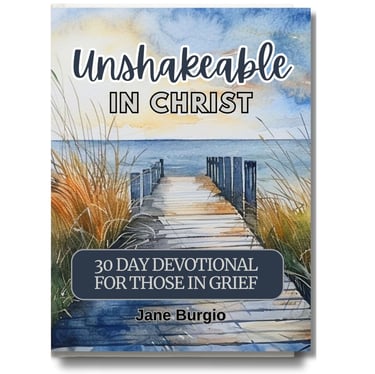Creating a New Routine: Daily Habits That Help Widows Heal
6/24/20256 min read
Finding Hope Together
Real Talk. Real Grace.


Welcome!
As a new widow, I've found that God is a true Father, a faithful Friend, and a deep Comforter. As I've learned to navigate this journey with grace, I've found things that are helpful, practical, and inspiring. That's what I want to pass along to you!
THE LATEST








Creating a New Routine: Daily Habits That Help Widows Heal
SHARED BY JANE BURGIO| LEAVE A COMMENT


This site MAY contain affiliate links, meaning I may earn a small commission—at no extra cost to you—if you make a purchase. I only recommend products I truly believe in. Thanks for your support!
“In the midst of winter, I found there was, within me, an invincible summer.” – Albert Camus
Becoming a widow changes your world in an instant. One day you’re doing life together—laughing, cooking, making plans—and the next, it’s just… quiet.
It's in that stillness—that can feel both unfamiliar and overwhelming—that something new can begin. God has a way of meeting us right in the middle of our grief. Psalm 34:18 reminds us, "The Lord is close to the brokenhearted and saves those who are crushed in spirit." It won't be quick or easy, but by God's grace, you can gently and slowly find a new rhythm—a new balance that makes space for both your grief and your healing.
In this post, I’m sharing the simple, grounding routines that helped me start to feel like myself again. These aren’t rigid routines or “how-to” steps. They’re gentle daily practices that can bring a sense of peace, purpose, and even comfort into your days. Healing isn’t about “moving on.” It’s about moving through—with grace, faith, and a little bit of fight.
1. Begin the Morning with Intention
Mornings can feel especially heavy when you're grieving. The quietness, the empty side of the bed—it all hits a little harder. Starting your day with a small moment of intention can help you feel grounded. That might mean a short prayer, reading a verse, or simply sitting with your coffee in silence and breathing.
One verse I return to often is Lamentations 3:22–23: "Because of the Lord’s great love we are not consumed, for his compassions never fail. They are new every morning." There’s comfort in remembering that God’s mercy meets us fresh each day—even on the hard ones.
Practical idea: Keep a notecard by your bedside with a favorite Scripture or affirmation to read before you reach for your phone.
2. Move Your Body, Gently
Grief doesn’t just affect the heart—it lives in the body too. Movement, even in small doses, helps release some of that heaviness. No need for a full workout. A short walk, light stretching, or gentle yoga can do wonders.
Some mornings I just walk to the mailbox and back. That’s enough. The goal isn’t productivity—it’s presence.
"Do you not know that your bodies are temples of the Holy Spirit... Therefore honor God with your bodies." (1 Corinthians 6:19-20)
Practical idea: Set a timer for 10 minutes and move however feels best for you. Let it be an offering, not an obligation.
3. Nourish Yourself Without Pressure
Eating well during grief can be surprisingly difficult. Food might not taste the same, or preparing a meal might feel overwhelming without your spouse there. But nourishment matters—not just physically, but emotionally.
Be kind to yourself. This isn’t the time for perfect nutrition. It’s about small, doable steps that show care for your body.
Practical idea: Keep a few healthy snacks and ready-to-eat meals on hand. And if someone offers to cook for you—say yes.
4. Anchor Your Day with One Purposeful Task
When everything feels uncertain, checking one thing off your list can offer a quiet sense of accomplishment. This doesn’t have to be big. It could be watering your plants, replying to an email, or making your bed.
Psalm 90:17 says, "May the favor of the Lord our God rest on us; establish the work of our hands for us—yes, establish the work of our hands." Even the smallest task can be sacred when offered to God.
Practical idea: Write down one gentle task each morning. Just one. Let that be enough.
5. Make Room for Grief—and Grace
It’s okay to cry. It’s okay not to cry. It’s okay to feel fine one moment and completely undone the next. Grief isn’t linear—and it doesn’t follow a schedule. Your routine shouldn’t push your grief aside; it should make room for it.
Create space to acknowledge what you’re feeling without judgment. That might look like journaling, praying, listening to music that moves you, or just sitting still.
Romans 8:26 reminds us, "The Spirit helps us in our weakness...the Spirit himself intercedes for us through wordless groans." Even when we can’t find the words, God is with us.
Practical idea: Choose a time in your day to check in with your heart. Maybe it’s after lunch or before bed. Ask yourself, “What do I need right now?”
6. Connect with Someone—Even Briefly
Grief can feel isolating, even when you’re surrounded by people. Reaching out might be the last thing you feel like doing, but even a short conversation can lift some of the weight. A text, a voice message, a short phone call—just something to remind you that you're not alone.
And if you’re not ready to talk, that’s okay too. Let people in at your own pace.
Ecclesiastes 4:9-10 reminds us, "Two are better than one...If either of them falls down, one can help the other up." Let others help you up, even if only a little.
Practical idea: Keep a short list of two or three safe people you can reach out to when you're having a hard day.
7. Wind Down with Care
Evenings can stir up emotions you managed to keep at bay during the day. The quiet can be comforting or it can feel hollow. Creating a nighttime rhythm can help settle your spirit before bed.
A warm bath, a favorite worship playlist, reading a devotional, or simply writing out one thing you're thankful for—these small acts can become a balm for your soul.
"In peace I will lie down and sleep, for you alone, Lord, make me dwell in safety." (Psalm 4:8)
Practical idea: Create a 15-minute evening routine you can repeat most nights. Let it become a signal to your body and spirit that it’s safe to rest.
Final Thoughts
This journey is deeply personal. No two widows will walk it the same way. But I believe—deep in my bones—that God walks it with us. He meets us in the quiet, in the routines, in the grief, and in the slow rebuilding.
So take your time. Be gentle with yourself. Start small. And remember: healing doesn’t mean forgetting. It means living—slowly, faithfully, fully—as you learn to carry love and loss side by side.
Suggested Resources for Widows
Modern Widows Club – Support and education
GriefShare – Grief recovery support groups
Soaring Spirits International – Widowed community and events
FREE GUIDE: What to Do After Your Spouse Dies




Looking for More Encouragement?
If this post encouraged you, you'll find more in my book, Unshakeable in Christ—a 30-day devotional centered on healing through our identity in Christ. Each day features a powerful "I AM" statement rooted in Scripture. It’s written for women who, while navigating life’s hardest seasons, yet cling to their identity in Christ as their firm, unshakeable foundation.
Share Your Story
Have you found comfort in any daily routines? What’s helping you heal? Share in the comments below—I’d love to hear what habits are helping you in this season, and your experience might give hope to someone else.
© 2025. GRACE AFTER LOSS


FOR THOSE WHO HOPE THERE’S MORE...
Loss may have shifted everything, but you’re still here—which means there’s more ahead. More joy. More purpose. More of His Presence. If you are ready to heal deeply, walk boldly, and live again through the strength only Jesus gives, then Grace After Loss is for you.
With real encouragement, faith-filled resources, and practical steps to help you move forward, you will remember and honor what was while growing into what can be. You were made to live purposefully with grace, even after the storm. Your next chapter can be beautiful. Let’s begin.
